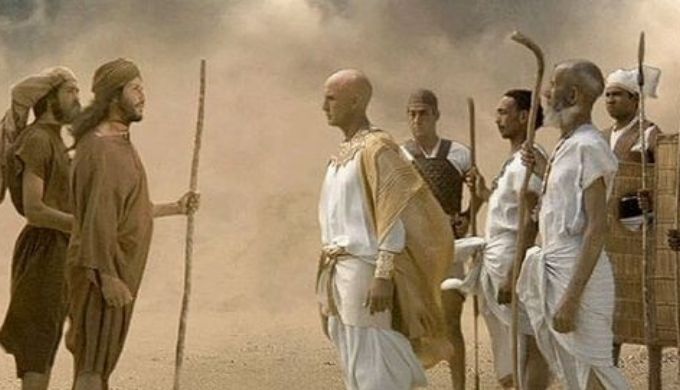We’ve all had bad days… but the Pharaoh of Egypt during the time of Moses? He had ten very specific reasons to rethink his choices. Whether you’ve seen the story in religious texts, films like The Prince of Egypt, or just heard your grandmother mention them over Easter dinner, the Ten Plagues have become a cultural symbol of divine payback in epic proportions.
Of course, they’re not exactly the kind of thing you’d face in your everyday life (unless your plumbing fails and your neighbor breeds frogs). But still, the imagination wanders. Which of these ancient curses would truly make you lose it? The water turning to blood? The darkness swallowing the sun? Or the emotionally scarring one, the death of the firstborn?
We’re not here to judge. We’re just asking you to vote:
Which plague would you absolutely, definitely NOT want to face?
The ten plagues
1. Water Turns to Blood
Imagine you open your kitchen tap, and instead of cool water, out comes thick, dark blood. Disgust aside, this plague symbolized the disruption of life at its core, the Nile was Egypt’s lifeline. No drinking, no washing, no crops… just chaos. And it lasted for seven days. A week without clean water would be a modern nightmare. One that hits very close to home in many places even today.
2. Frogs Everywhere
Yes, frogs are cute in moderation. But the second plague turned them into a horror movie trope. Frogs in your bed, your oven, your shoes… Frogs everywhere. It wasn’t dangerous per se, but it was deeply unsettling. It’s one thing to hear croaking by a pond. It’s another to have them hopping over your pillow every night.
3. Lice or Gnats
Small, irritating, and impossible to avoid. Whether we interpret this plague as lice or gnats, the result is the same: constant discomfort. These creatures infested both humans and animals. There’s no rest when your skin is crawling and your livestock is shaking. Not a glamorous plague, but definitely one that wears you down, mentally and physically.
4. Swarms of Flies
The fourth plague raised the stakes. Swarms of buzzing, biting flies filled the air, homes, and every available surface. It wasn’t just the noise or the filth, it was the invasion. The feeling that you couldn’t get away from it, no matter where you went. Personal space? Forgotten.
5. Livestock Disease
This was an economic and emotional blow. Cows, horses, sheep, donkeys… all fell victim to an intense epidemic. In a society where animals were both wealth and survival tools, this plague broke the backbone of Egyptian livelihood. It might seem less dramatic, but imagine losing your car, your savings, and your groceries in one go.
6. Boils and Sores
Now we’re getting personal. Painful, infected boils covered people’s bodies. Hygiene? Impossible. Comfort? A distant memory. Beyond the physical pain, this plague also attacked dignity. It’s hard to feel powerful or presentable when you’re covered in sores. Even the Pharaoh’s magicians couldn’t stand upright from the pain.
7. Hailstorm of Destruction
Egypt’s first extreme weather alert came with a vengeance. Thunder, fire, and hail rained down, destroying crops, homes, and anything left outside. Think of it as nature’s wrath turned up to 100. For a desert-based society, unprepared for heavy weather, this was apocalyptic.
8. Locusts
If any plague had a sequel, it was the locusts. After the hail, they came to finish what was left. Swarming in such massive numbers they darkened the sky, locusts consumed every green thing. It was a devastating ecological collapse. No food, no trade, no hope.
9. Darkness for Three Days
The absence of light. No sunrise, no moon, no stars… just suffocating darkness. For three full days. This wasn’t just an inconvenience; it was psychological warfare. A world without light is a world without direction, without time, without certainty. And yes, it got very creepy, very fast.
10. Death of the Firstborn
The final and most harrowing plague. A blow straight to the heart of every household. The emotional gravity of this plague can’t be understated. It was personal, final, and tragic. Whether you take it as legend or faith, it’s the moment that broke Pharaoh’s will. And understandably so.











